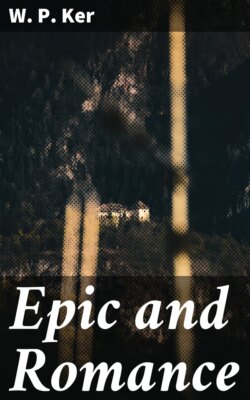Читать книгу Epic and Romance - W. P. Ker - Страница 57
На сайте Литреса книга снята с продажи.
ОглавлениеRomance by itself is a kind of literature that does not allow the full exercise of dramatic imagination; a limited and abstract form, as compared with the fulness and variety of Epic; though episodes of romance, and romantic moods and digressions, may have their place, along with all other human things, in the epic scheme.
The difference between the greater and the lesser kinds of narrative literature is vital and essential, whatever names may be assigned to them. In the one kind, of which Aristotle knew no other examples than the Iliad and the Odyssey, the personages are made individual through their dramatic conduct and their speeches in varying circumstances; in the other kind, in place of the moods and sentiments of a multitude of different people entering into the story and working it out, there is the sentiment of the author in his own person; there is one voice, the voice of the story-teller, and his theory of the characters is made to do duty for the characters themselves. There may be every poetic grace, except that of dramatic variety; and wherever, in narrative, the independence of the characters is merged in the sequence of adventures, or in the beauty of the landscape, or in the effusion of poetic sentiment, the narrative falls below the highest order, though the art be the art of Ovid or of Spenser.
The romance of Odysseus is indeed "brought into conformity with poetic verisimilitude," but in a different way from that of Bossu On the Epic Poem. It is not because the Phaeacians are romantic in their tastes, but because it belongs to Odysseus, that the Phaeacian night's entertainment has its place in the Odyssey. The Odyssey is the story of his home-coming, his recovery of his own. The great action of the drama of Odysseus is in his dealings with Penelope, Eumaeus, Telemachus, the suitors. The Phaeacian story is indeed episodic; the interest of those adventures is different from that of the meeting with Penelope. Nevertheless it is all kept in harmony with the stronger part of the poem. It is not pure fantasy and "Faerie," like the voyage of Maelduin or the vigil in the castle of Busirane. Odysseus in the house of Alcinous is not different from Odysseus of the return to Ithaca. The story is not pure romance, it is a dramatic monologue; and the character of the speaker has more part than the wonders of the story in the silence that falls on the listeners when the story comes to an end.
In all early literature it is hard to keep the story within limits, to observe the proportion of the Odyssey between strong drama and romance. The history of the early heroic literature of the Teutonic tongues, and of the epics of old France, comes to an end in the victory of various romantic schools, and of various restricted and one-sided forms of narrative. From within and without, from the resources of native mythology and superstition and from the fascination of Welsh and Arabian stories, there came the temptation to forget the study of character, and to part with an inheritance of tragic fables, for the sake of vanities, wonders, and splendours among which character and the tragic motives lost their pre-eminent interest and their old authority over poets and audience.
